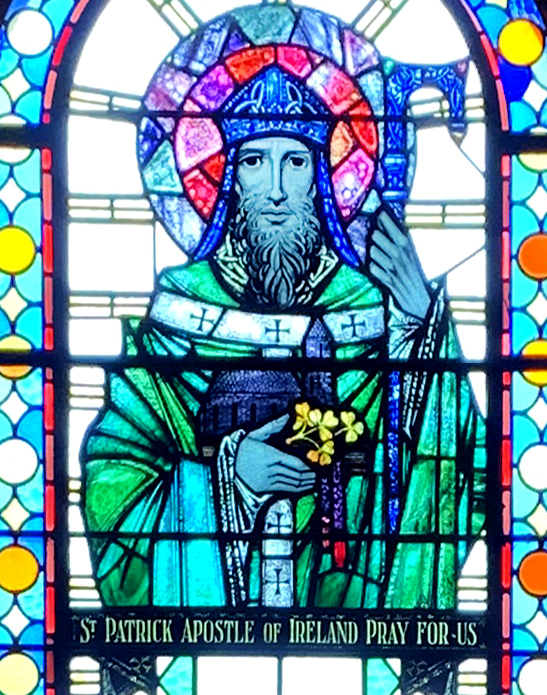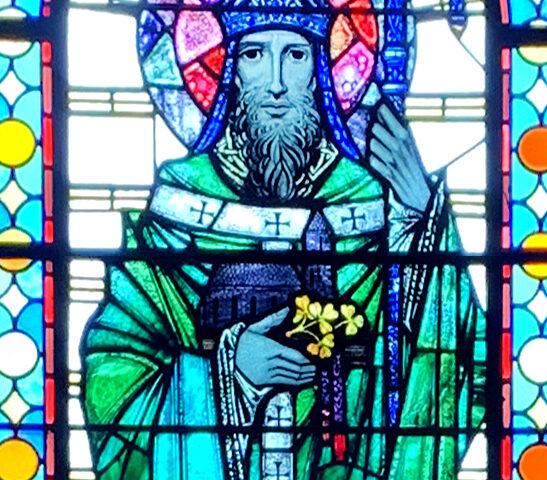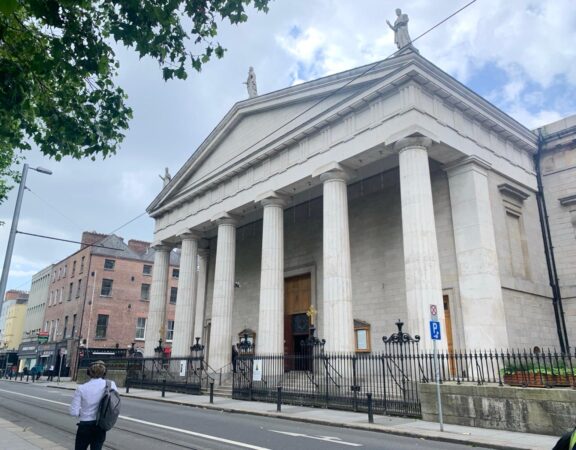St Patrick’s Day 2024
Homily of Archbishop Dermot Farrell
St Mary’s Pro-Cathedral, Dublin
National celebrations can be occasions for a great deal of rhetoric. Today’s celebration is no exception. Many legends have grown up around our national apostle. It is therefore important to balance our national narratives by Patrick’s own words, as these reveal Patrick, Ireland’s apostle, and what inspired him—a person of faith and zeal, a person of deep inner life and resourcefulness, whose life followed unforeseen paths; someone whose suffering was great, and was not diminished by it, and who became a successful missionary, learning the language of his adopted people and returning to them in service and hope.
In his ‘confession,’ Patrick says of himself: “Although I am imperfect in many ways, I want my brothers and relations to know what I’m really like, so that they can see what it is that inspires my life.” (Confessio §6). From the Confession, his very short autobiography, we know what inspires Patrick’s life: he lived out of his relationship with Christ; he was steeped in the mind-set of Christ. He was someone of deep and genuine prayer. In the vulnerable silence of prayer, he allowed God to do new and unexpected things. Through prayer his inner self was strengthened, along with his capacity to grasp the primacy of invisible things over visible things (see 2 Cor 4:16-18). From his heart, from within, sprung the decisions that guided his whole life. To return to his words, “I want my brothers and relations to know what I’m really like, so that they can see what it is that inspires my life.”
The shock and brutality of his treatment at the hands of the Irish, did not turn Patrick in on himself, and in his liberation from Ireland, he did not close off his past, as it were. He did not shut out the deeper need of his captors, but managed to hear their cry, “the cry of the poor” in a true sense. Patrick’s view of the world is not a fortress view, his worldview is a view that brings him to encounter people as they are.

As Pope Francis was to declare almost 1,600 years later, “We are all related…; we are all dependent on one another (Laudato Si’ 16, 42, 91 and 92). Essentially, this means that we may not close ourselves to the pain of those around us who are suffering. This is what Patrick embraced, and embraced radically: “whoever serves me, he must follow me, wherever I am, my servant will be there too,” as Jesus says in today’s Gospel (John 12:26).
Christ, our brother, is to be found in the midst of the poor, of those left behind, of the excluded. That is the “wherever I am” of our Lord. If we are oblivious to the pain of those who are forced to migrate or trafficked into our country and have no access to resources, housing, healthcare to name but a few areas, our faith is just an illusion (see Laudate Deum, 2). Human nature being what it is, it is sometimes easier to be moved by the plight of those suffering in far off places and to filter out the suffering of those closer to home whose needs require responses which can be challenging and unsettling.
Over 50 years ago, Pope St Paul VI, writing of the social problems caused by the recent and rapid migration of people into the mega-cities of the developing world would say,
“It is in fact the weakest who are the victims of dehumanizing living conditions, degrading for conscience and harmful for the life of the family, …young couples waiting in vain for a decent dwelling at a price they can afford are demoralized and their [shared life] can thereby even be endangered.” (Octogesima Adveniens (1971) § 11)
That naming the consequences of rapid social and economic change was in 1971. Further on, in the same letter, Pope Paul VI would turn to the role the Church might have to play in the response to such demographic change:
“Let every person examine themselves, to see what they have done up to now, and what they ought to do. It is not enough to recall principles, state intentions, point to crying injustice and utter prophetic denunciations; these words will lack real weight unless they are accompanied for each individual by a livelier awareness of personal responsibility and by effective action. It is too easy to throw back on others responsibility for injustice, if at the same time one does not realise how each one shares in it personally, and how personal conversion is needed first.” (§48)
Patrick returned to the Irish; he returned to us to bring us good news. Patrick’s words did not “lack weight [as] they were accompanied by a lively awareness of personal responsibility.” Patrick put flesh on what would follow from the Second Vatican Council:
“a renewed consciousness of the demands of the gospel makes it the Church’s duty to put herself at the service of all, to help them grasp their serious situation in all its dimensions, and to convince them that solidarity in action at this turning point in human history is a matter of urgency.” (Pope St. Paul VI, Octogesima Adveniens [1971] § 5, citing Populorum Progressio §1).
The response to injustice is the responsibility of all. It is our response. It is a response of solidarity—our solidarity, and it is a response of empowerment—our empowerment of those at a disadvantage, those being left behind. But more is needed: our response also needs to be innovative, we need to find new ways. The strategies that worked for our Church in this land over the last two centuries no longer work in the 21st century. This has been the constant call of the Church and of its Magisterium in, and since, the Second Vatican Council. Pope Francis puts it like this:
“Instead of being just a church that welcomes and receives by keeping the doors open, let us try also to be a church that finds new roads, that is able to step outside itself and go to those who do not attend Mass, to those who have left [the Church] or are indifferent.” (Antonio Spadaro SJ, Interview with Pope Francis. See “A Big Open Heart to God: An Interview with Pope Francis: America, 30th September 2013: page 23)
What holds for the work of justice, can also be said of the work of bringing good news. We see this in Patrick, who does not “throw back on others responsibility for bringing good news.” Patrick brings the good news himself. He has that “livelier awareness of personal responsibility and effective action” which Pope Paul VI saw as vital. That personal responsibility, one might call it that ownership, transforms our words into words grounded in reality, and our proclamation into a proclamation grounded in the concrete hope of our lives.
This is good news from below. This is what we need: not good news at a distance, good news from on high, good news that is close to people, that brings God’s tenderness and faithfulness close to people in their “joys and the hopes, the griefs and the anxieties,” to recall the opening words of Gaudium et Spes – The Pastoral Constitution of the Church in the Modern World (§1).
To preach the gospel effectively is not just to tell people about God. The culmination of human knowing about God is not conceptual; it is experiential. We feel God. To be effective evangelisers is to carry within ourselves that tension between the life of God and that which is furthest away, alienated and hurt. That’s what Patrick did, that was his mission. That mission is now ours, and is as formidable now as it was in 432, and just as necessary.
Pádraig, Aspal Éireann: guí orainn.
+Dermot Farrell
Archbishop of Dublin







